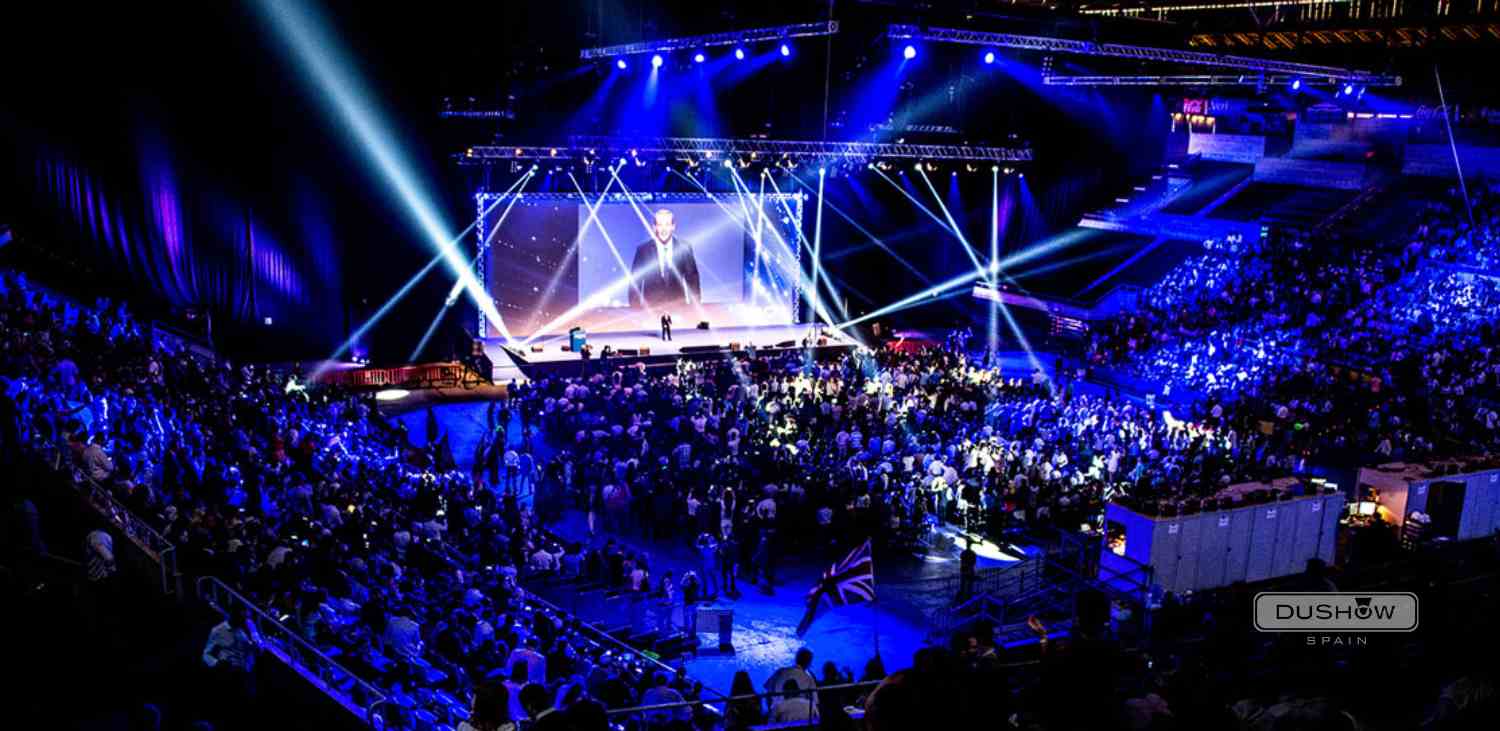Understanding Event Production: Why It Is Very Important for Successful Gatherings
Event production plays a critical function in shaping effective events. It involves cautious preparation, sychronisation, and execution to ensure every information lines up with the event's vision. This procedure not only improves participant experiences however additionally assists in meaningful connections amongst participants. Comprehending the intricacies of event production can considerably influence the general end result. What are the crucial elements that add to a successful event, and just how can they be effectively handled?
The Duty of Event Production in Creating Remarkable Experiences
Many elements contribute to the success of an occasion, event production plays a crucial role in crafting memorable experiences. This diverse process incorporates numerous elements, including planning, logistics, and execution. Effective event production guarantees that every detail lines up with the general vision, producing a smooth circulation that astounds guests. By working with timelines, taking care of sources, and overseeing technical aspects, event producers develop a foundation for impactful experiences.Moreover, they curate atmospheres that reverberate with the target audience, improving interaction and emotional connection. From selecting ideal places to incorporating cutting-edge modern technology, the selections made throughout production substantially affect just how guests view and keep in mind the event. By prioritizing top quality and focus to detail, event production transforms common gatherings right into phenomenal minutes, leaving long lasting impressions. Ultimately, the experienced orchestration of these elements defines the essence of an event, showcasing the importance of specialist event production in accomplishing phenomenal outcomes.
Secret Parts of Effective Event Production
Efficient event production hinges on a number of key elements that assure success. Planning and sychronisation develop a solid structure, while technological configuration needs address logistical requirements. In addition, executing target market involvement techniques boosts the overall experience, making the event unforgettable.
Planning and Control
Planning and sychronisation work as the foundation of successful event production, making certain that every information aligns perfectly to develop a remarkable experience. Effective planning involves developing a clear vision and purposes, while control requires the meticulous company of logistics, routines, and sources. A distinct timeline is essential, directing all stakeholders with important landmarks and jobs. Interaction plays a pivotal role, promoting partnership amongst group participants, vendors, and venue staff. Routine meetings and updates assist to attend to obstacles without delay, ensuring that everyone stays lined up with the event objectives. Inevitably, a structured technique to preparation and coordination not only boosts effectiveness yet likewise significantly adds to the general success and satisfaction of the event for participants and coordinators alike.
Technical Configuration Demands
A successful event relies greatly on its technological setup requirements, which incorporate necessary parts such as audio-visual devices, illumination, hosting, and connection. Audio-visual devices includes microphones, audio speakers, and projectors, guaranteeing that presentations and efficiencies are provided plainly. Appropriate lights improves the ambiance and highlights vital areas, while staging supplies the required system for speakers and entertainers. Connection, including Wi-Fi and electric gain access to, is essential for smooth communication and modern technology combination. Each component must be thoroughly planned and executed, customized to the event's particular demands. Insufficient technological setups can cause disruptions, negatively influencing the overall experience for guests, underscoring the significance of comprehensive prep work and focus to detail in event production.
Target Market Involvement Techniques

The Significance of Preparation and Sychronisation
Preparation and coordination are vital to the success of any kind of event production. Effective timeline monitoring, source allocation strategies, and team communication characteristics play essential roles in ensuring that all elements collaborated seamlessly. Without an organized strategy to these facets, events take the chance of encountering hold-ups, budget plan overruns, and miscommunication among employee.
Reliable Timeline Administration


While successful event production commonly pivots on creative thinking and execution, effective timeline management stays a necessary component that can not be forgotten. A well-structured timeline functions as the foundation of any kind of event, making certain that each stage is implemented in a timely fashion. It enables the coordination of various jobs, from place setup to visitor arrivals, while protecting against potential bottlenecks. By clearly describing due dates and duties, event organizers can preserve focus and adjust to unforeseen difficulties. Furthermore, a carefully crafted timeline cultivates communication amongst staff member, promoting responsibility and partnership. Ultimately, reliable timeline monitoring not only enhances operational effectiveness but also contributes greatly to the overall success and smooth execution of the event, leaving participants with an unforgettable experience.
Source Allotment Techniques
Reliable source allowance strategies are critical for the successful execution of any type of event. Proper preparation permits event coordinators to identify and disperse sources, such as financial resources, workers, and products, in a fashion that makes best use of effectiveness. By assessing the certain needs of each element of the event, organizers can focus on jobs and designate resources accordingly. Sychronisation among various divisions guarantees that all components, from satisfying audiovisual demands, are effectively sustained. This critical approach not just reduces waste yet additionally improves the total experience for guests. Furthermore, preparing for potential obstacles and having contingency plans in position permits smoother operations. Inevitably, efficient source allocation contributes considerably to accomplishing event goals and assuring a memorable gathering.
Group Communication Characteristics
Just how can smooth communication among employee change the event production process? Effective interaction is important for working with tasks, sharing updates, and addressing obstacles in real-time. When employee take part in open discussion, they can promptly recognize possible concerns and establish services collaboratively, minimizing delays and misunderstandings. This dynamic fosters a cohesive environment where everyone comprehends their roles and duties, bring about a much more synchronized effort. Furthermore, regular check-ins and responses loops boost responsibility and assurance placement with the event's objectives. By prioritizing interaction methods, teams can simplify operations, bolster morale, and inevitably raise the overall high quality of the event. Effective events rest on the capacity to interact effectively, making it an essential component of event production.
Enhancing Guest Interaction Via Creative Design
Innovative layout plays a critical duty in improving attendee engagement at events, as it fosters an immersive setting that astounds participants' interest. By incorporating ingenious visuals, interactive components, and thematic style, event coordinators can develop remarkable experiences that reverberate with participants. Thoughtful format styles promote activity and exploration, urging visitors to interact with displays and each other.Incorporating innovation, such as augmented truth or live polling, additional enhances the experience, permitting real-time feedback and interaction. Furthermore, sensory components like lighting, noise, and fragrance can evoke feelings and create a more interesting atmosphere.The use of narration with design helps communicate the event's function and message, making it extra relatable for guests. Eventually, imaginative style not just boosts engagement however additionally deepens links among participants, leaving a lasting perception that prolongs beyond the event itself. This strategic method to style is vital for effective events.
Handling Logistics for a Smooth Execution
While the excitement of an occasion can attract guests in, managing logistics is essential to secure a smooth execution. This includes diligently working with numerous aspects, from venue option and design to catering and transportation. Reliable logistics management moved here assures that all elements line up, permitting for a smooth circulation from registration to the final thought of the event.Additionally, a clear interaction plan amongst all stakeholders is imperative. This includes staff, suppliers, and volunteers, who should be notified of their functions and responsibilities. Anticipating possible difficulties, such as equipment failure or unexpected weather condition conditions, can better improve the event's success.Creating an in-depth timeline aids maintain the group on track and permits timely adjustments. Eventually, well-managed logistics not only help with a satisfying experience for participants yet also show the professionalism and integrity of the organizers, adding to the total success of the event.

The Effect of Innovation on Event Production
What function does innovation play in shaping modern event production? Modern technology has actually ended up being a cornerstone of reliable event production, improving both planning and implementation processes. From innovative enrollment systems to interactive apps, modern technology improves attendee administration and improves involvement. Virtual event systems allow coordinators to reach bigger audiences, damaging geographical barriers and facilitating hybrid events that combine in-person and on the internet experiences.Additionally, audiovisual technologies, such as high-def screens and stereos, boost the high quality of presentations and efficiencies, guaranteeing a remarkable experience for attendees - event production charlotte. Social media site integration allows real-time responses and interaction, promoting area engagement previously, throughout, and after the event. Furthermore, data analytics devices aid organizers in keeping track of individual actions and preferences, enabling tailored experiences that reverberate with varied target markets. Generally, the assimilation of modern technology in event production not only enhances operational efficiency but also enhances guest experiences, eventually adding to the success of the event
Examining Success: Determining the Results of Your Event
Success in event production pivots on efficient examination, which includes determining a range of results to examine the general effect of an event. To achieve this, organizers can employ both qualitative and measurable metrics. Measurable actions might include participation figures, ticket sales, and revenue generated, while qualitative analyses could include guest contentment surveys and feedback forms.Additionally, analyzing social media sites involvement and media insurance coverage can supply insights right into the event's reach and brand name effect. Comparing these metrics versus predefined goals helps establish if the purposes were met.Furthermore, post-event debriefs with the planning team can reveal lessons discovered and areas for renovation. By systematically evaluating these end results, event producers can improve future events, ensuring continual growth and success. Inevitably, a detailed examination not only highlights success but additionally informs have a peek at this site critical decisions for succeeding events, fostering a society of excellence in event production.
Often Asked Inquiries
What Certifications Should an Occasion Producer Have?
Event manufacturers should have strong business abilities, imagination, and reliable communication capabilities. A history in project monitoring, budgeting, and negotiation is necessary. Relevant accreditations and experience in varied event types even more boost their qualifications.
Exactly How Can I Minimize Event Production Costs Efficiently?
To properly reduce event production costs, one can enhance supplier option, negotiate contracts, use internal sources, prioritize crucial elements, carry out modern technology for performance, and site web explore sponsorship opportunities to offset costs without jeopardizing high quality.
What Are the Typical Obstacles in Event Production?
Usual obstacles in event production consist of spending plan restraints, logistical control, supplier monitoring, time constraints, participant involvement, technological problems, and unanticipated scenarios - event production charlotte. Each aspect can considerably affect the general success and smooth execution of the event
How Do I Choose the Right Place for My Event?
Picking the ideal location includes considering factors such as area, ability, features, and budget plan. Additionally, evaluating access and setting ensures the selected room straightens with the event's objectives and enhances the total guest experience.
What Is the Common Timeline for Preparation an Occasion?
The common timeline for intending an occasion varies, yet typically includes phases such as concept growth, location option, vendor coordination, promo, and final prep work, frequently extending a number of months to guarantee an effective implementation.
Comments on “Preparing for the unexpected with event production charlotte’s backup plans”